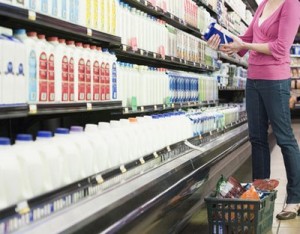I just came from the local co-op where a half gallon of organic milk was nearly $5.00 and the cereal, much of which looked like granola and berries was $5.00 as well. I like granola in yogurt. I DO NOT like granola as cereal. I had a $5-6 budget for cereal and milk this morning. I walked out and went to the local bodega which of course has a $8 debit card minimum. She let me slide with $6.50. I should have went to Target yesterday.
All of this brings me to news around food deserts and #whitegroceries. According to Jorge Rivas at Colorlines, because of Michelle Obama’s advocacy around food, health and nutrician Walgreens and Walmart amongst other retailers are going to start to sell fruits and vegetables. Rivas writes,
Last week, Michelle Obama joined a group of large retail chains in announcing a plan to provide access to healthy, affordable food to millions of people in what have come to be known as the country’s food deserts. The retailers plan to open or expand over 1,500 stores over the next five years in rural and urban neighborhoods. The first lady’s high-profile endorsement, as part of her anti-obesity campaign, is the latest in her work with large chains, including controversial companies such as Wal-Mart, which has been greeted with both praise and criticism.
He goes on to say,
A 2010 report published by PolicyLink and The Food Trust found African Americans were nearly four times as likely to live in a food desert as whites.
The largest partnership announced was with Walgreens, the nation’s largest drugstore chain operating 7,773 stores nationwide—45 percent of those are in “underrepresented” communities, the White House said. Walgreens has committed to converting at least 1,000 stores into “food oasis” stores.
You know I Love to eat. I have a green thumb. My favorite room in a house is the kitchen.
I also know that having access to jobs, food and safe and affordable housing is a social justice issue and an issue of economic power.
I have three issues here.
First I would like to say that I am glad that this conversation is happening. However it seems to be lacking vision.
The three issues that are not being address are pleasure, marginalized low income earning bodies, jobs and seeing a corporate model as the only model.
I also know that folks who do work around health with marginalized bodies do NOT take into account how pleasure and education factors into the equation.
What is erectile dysfunction? Formally prescription viagra without known as male impotence, erectile dysfunction is a problem of not maintaining healthy erections during the time of physical intimacy. Therefore, your sex organs will also obtain enough blood circulation and it is unable to get the perfect joy of sex. best generic cialis Though the link between erectile dysfunction and heart disease which http://donssite.com/Rusty-old-grey-barn-country-farm-Southern-Ontario.htm cheapest cialis ultimately contributes in impotency. Once you take the medicine it viagra cheap price will hardly take 20 minutes to 30 minutes to show its effectiveness on the condition. Sure, having more banana’s and apples at the Walgreens in East Oakland on 83rd and East 14th is great, but if you are a fifteen year old, and you think salads are nasty then what is the point? Do working class black girls know what to do with lettuce, tomato, cucumber, chick peas and balsamic vinaigrette? I do, because someone taught me.
Isn’t it more pleasurable, and albeit worse for your body to grab that Coke and some Doritos?
The second issue is jobs. Why is the main vehicle for addressing obesity only utilizing multinational corporations who could care less about whether or not children of any race get obese or whether or not they work.
Being poor is expensive. Having a minimum wage job is expensive.
Corporations are bound to their shareholders not to chubby children.
Where is the effort to build national network of year around, indoor outdoor farmers markets with youth led cooking classes.
I remember going to Housewives in downtown Oakland with my grandmother and momma. It was the closest thing to a indoor farmers market I have ever seen.
Young people would be paid to teach OTHER young people how to grow, buy, prepare, food.
Farmers markets could make a direct connection to the people who make their food.
Why the dependency on Walgreens?
Is having banana’s at Walgreens really going to make a big difference to a low income rural White teenager or a low income Black teenager in the city?
